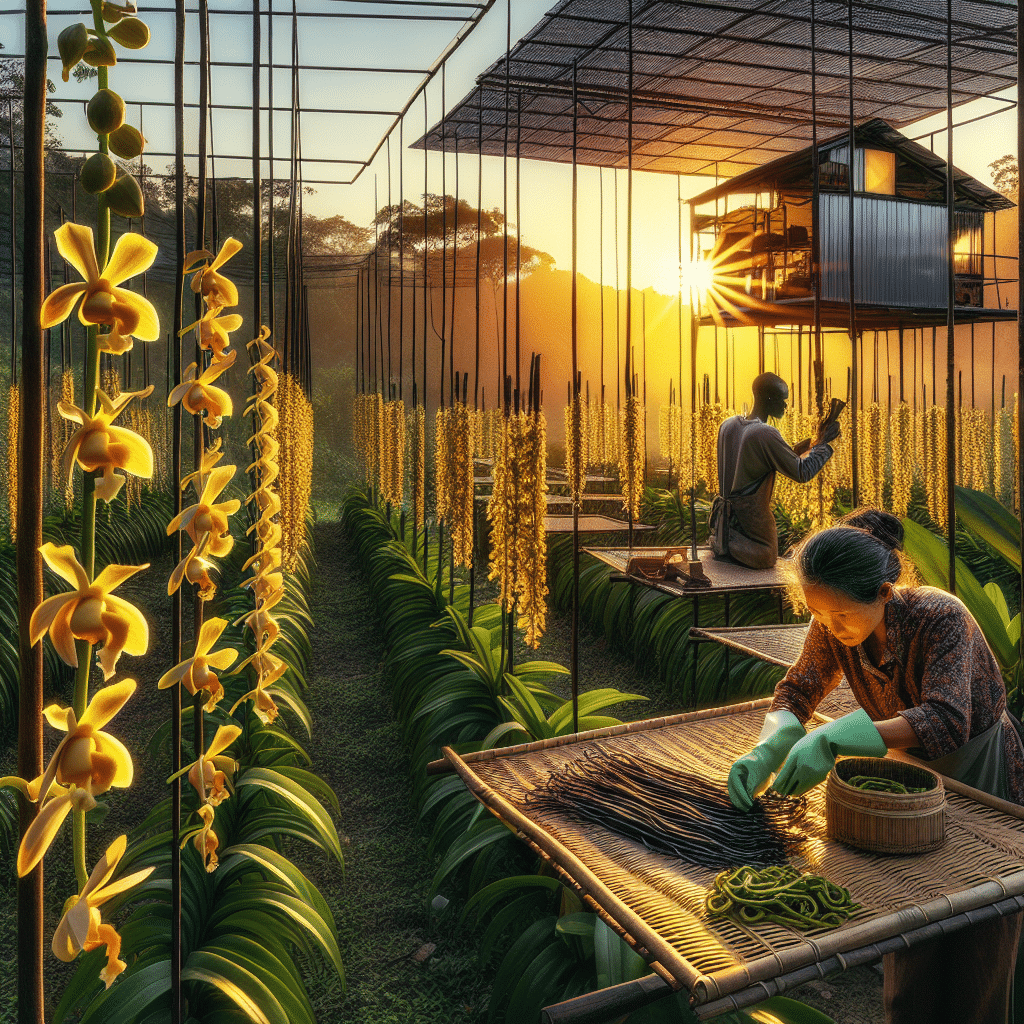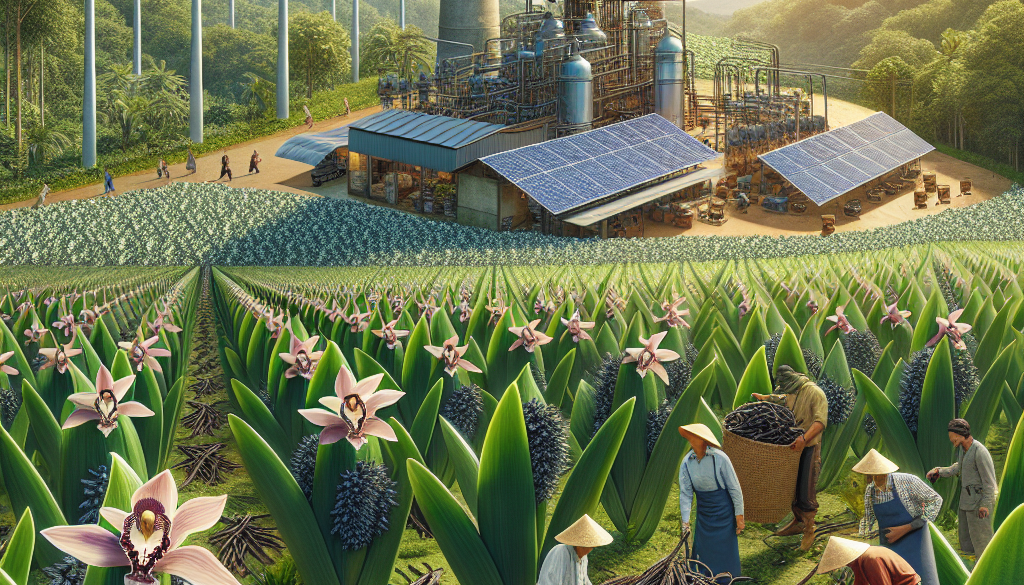A Sustainable Pursuit of Vanilla Extraction
-
Table of Contents
- Sustainable Vanilla Extraction: Ensuring Flavor and Future
- The Vanilla Industry: A Fragile Ecosystem
- Challenges in Vanilla Cultivation and Extraction
- Strategies for Sustainable Vanilla Extraction
- Agroforestry Practices
- Fair Trade and Direct Trade Initiatives
- Organic Certification
- Climate-Adaptive Agriculture
- Traceability and Transparency
- The Impact of Sustainable Vanilla Extraction
- Case Studies and Statistics
- Conclusion: The Sweet Taste of Sustainability
- ETprotein: Enhancing Your Health with Sustainable Protein Options
Sustainable Vanilla Extraction: Ensuring Flavor and Future

Vanilla, with its sweet and complex flavor profile, is a beloved ingredient worldwide. However, the journey from orchid to extract is fraught with environmental and social challenges. Sustainable vanilla extraction is not just about preserving the delicate flavor that enhances our favorite desserts and fragrances; it’s about ensuring the future of vanilla farming communities and the ecosystems they inhabit. This article delves into the sustainable pursuit of vanilla extraction, exploring the methods, benefits, and global impact of ethical practices in the vanilla industry.
The Vanilla Industry: A Fragile Ecosystem
Vanilla is derived from the pods of the Vanilla planifolia, an orchid native to Mexico. Today, Madagascar leads the world in vanilla production, followed by Indonesia and other tropical countries. The industry is labor-intensive, requiring hand-pollination and careful harvesting. The traditional extraction process involves curing and drying the beans, then soaking them in alcohol to create the extract.
Despite its popularity, the vanilla industry faces significant sustainability issues. Deforestation, climate change, and volatile market prices threaten vanilla orchids’ natural habitat and the livelihoods of smallholder farmers. Moreover, synthetic vanilla, derived from petrochemicals or byproducts of the paper industry, dominates the market, offering a cheaper but environmentally damaging alternative to natural vanilla.
Challenges in Vanilla Cultivation and Extraction
- Deforestation for vanilla cultivation reduces biodiversity and disrupts ecosystems.
- Climate change impacts the delicate balance required for vanilla orchids to thrive.
- Market volatility leads to economic instability for farmers.
- Intensive labor requirements and low wages can result in poor working conditions.
- Synthetic vanilla production contributes to pollution and reduces demand for natural vanilla.
Strategies for Sustainable Vanilla Extraction
To address these challenges, several strategies are being implemented to promote sustainable vanilla extraction:
Agroforestry Practices
Integrating vanilla cultivation with other crops can preserve biodiversity and improve soil health. Agroforestry systems mimic natural forests, providing shade for vanilla orchids and creating habitats for wildlife. This method also diversifies income for farmers, making them less dependent on vanilla prices.
Fair Trade and Direct Trade Initiatives
These initiatives ensure that farmers receive a fair price for their vanilla, improving their economic stability. By establishing direct relationships with farmers, companies can bypass middlemen, leading to better wages and investment in community development.
Organic Certification
Organic vanilla is grown without synthetic pesticides or fertilizers, reducing environmental toxins and promoting healthier ecosystems. Organic certification can also fetch a premium price, benefiting farmers financially.
Climate-Adaptive Agriculture
Training farmers in climate-adaptive techniques helps them adjust to changing weather patterns. This includes planting cover crops, improving water management, and selecting resilient vanilla varieties.
Traceability and Transparency
Traceability systems allow consumers to know where their vanilla comes from and how it was produced. This transparency encourages accountability and supports ethical practices in the supply chain.
The Impact of Sustainable Vanilla Extraction
Sustainable vanilla extraction has far-reaching benefits:
- Preservation of ecosystems and biodiversity.
- Improved livelihoods and working conditions for farmers.
- Higher-quality vanilla with better flavor profiles.
- Reduced reliance on synthetic vanilla and associated environmental harm.
- Strengthened resilience of vanilla crops to climate change.
Case Studies and Statistics
Several initiatives demonstrate the positive impact of sustainable vanilla practices. For example, in Madagascar, programs that promote agroforestry and fair trade have led to a reported 50% increase in income for participating farmers. Globally, the demand for natural vanilla has been growing, with the market expected to reach $810 million by 2025, according to a report by Grand View Research.
However, only a small fraction of vanilla is produced sustainably. Increasing consumer awareness and demand for ethically sourced vanilla can drive change in the industry.
Conclusion: The Sweet Taste of Sustainability
The pursuit of sustainable vanilla extraction is a complex but necessary endeavor. By supporting environmentally friendly and socially responsible practices, consumers and companies can contribute to a more sustainable future for the vanilla industry. The benefits of such efforts extend beyond the rich flavor of natural vanilla, fostering a healthier planet and more equitable communities.
ETprotein: Enhancing Your Health with Sustainable Protein Options
In line with sustainable and ethical sourcing, ETprotein offers a range of organic bulk vegan proteins that cater to health-conscious consumers and environmentally responsible companies. Their products, including organic rice protein, pea protein, and various seed proteins, are non-GMO, allergen-free, and characterized by a neutral taste. ETprotein’s commitment to quality and sustainability makes them an excellent choice for those seeking to incorporate sustainable ingredients into their diets or product offerings.
About ETprotein:
ETprotein, a reputable protein and L-(+)-Ergothioneine (EGT) Chinese factory manufacturer and supplier, is renowned for producing, stocking, exporting, and delivering the highest quality organic bulk vegan proteins and L-(+)-Ergothioneine. They include Organic rice protein, clear rice protein, pea protein, clear pea protein, watermelon seed protein, pumpkin seed protein, sunflower seed protein, mung bean protein, peanut protein, and L-(+)-Ergothioneine EGT Pharmaceutical grade, L-(+)-Ergothioneine EGT food grade, L-(+)-Ergothioneine EGT cosmetic grade, L-(+)-Ergothioneine EGT reference grade and L-(+)-Ergothioneine EGT standard. Their offerings, characterized by a neutral taste, non-GMO, allergen-free attributes, with L-(+)-Ergothioneine purity over 98%, 99%, cater to a diverse range of industries. They serve nutraceutical, pharmaceutical, cosmeceutical, veterinary, as well as food and beverage finished product distributors, traders, and manufacturers across Europe, USA, Canada, Australia, Thailand, Japan, Korea, Brazil, and Chile, among others.
ETprotein specialization includes exporting and delivering tailor-made protein powder and finished nutritional supplements. Their extensive product range covers sectors like Food and Beverage, Sports Nutrition, Weight Management, Dietary Supplements, Health and Wellness Products, and Infant Formula, ensuring comprehensive solutions to meet all your protein needs.
As a trusted company by leading global food and beverage brands and Fortune 500 companies, ETprotein reinforces China’s reputation in the global arena. For more information or to sample their products, please contact them and email sales(at)ETprotein.com today.












